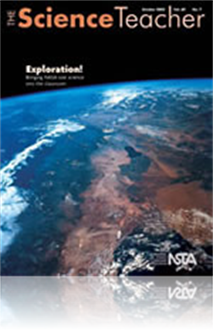All Resources
Journal Article
Investigating Microgravity: Using inquiry, students study objects in a weightless environment
In classroom discussions, students often have misconceptions about how objects behave in a weightless environment. This article provides instruction on how to create a weightless environment in the classroom to enable students to examine the behavior...
Journal Article
The Idea Bank provides tips and techniques for creative teaching, in about 1,000 words. In this month’s Idea Bank learn about other potential uses for slime, in addition to polymer chemistry and materials engineering....
Journal Article
After the Bell: Measure for measure
Students are asked to measure objects almost every day, but a number of students omit units when providing an answer. In this article learn why units are so important....
Journal Article
If we want to encourage children to enter into scientific fields in the future, we need to give them a helping hand while they are most open-minded and curious. In this article, the author shares anecdotal stories from the scientific community that r...
Journal Article
Science Sampler: Role playing in the science classroom
By presenting material in a unique and amusing way, students will remember the material better and comprehend more....
Journal Article
Research and Teaching: Encouraging Female Undergraduate Students
Two case studies of undergraduate chemistry departments highlight differences between a department graduating a high percentage of women and one that is not, and provide possible ways in which departments can attract and retain more female majors. A ...
Journal Article
Working as a Team: Preparing a Problem Awareness File
A generic teaching format in which students actively participate in a whole-class collaborative-learning experience is described. The entire class, divided into groups, made a joint effort to overcome a hypothetical outbreak of a new plant disease. H...
Journal Article
Most teachers and parents will agree: Children are natural inventors. They also enjoy building things with such manipulatives as Legos. Robotics was the route to dynamic, problem-based learning for fourth- and fifth-grade students at Emma Sherman Ele...
Journal Article
Science Sampler: Focusing in on the history of the microscope
Teachers can use a historical context to add interest to common science lessons—in this case, the microscope....





